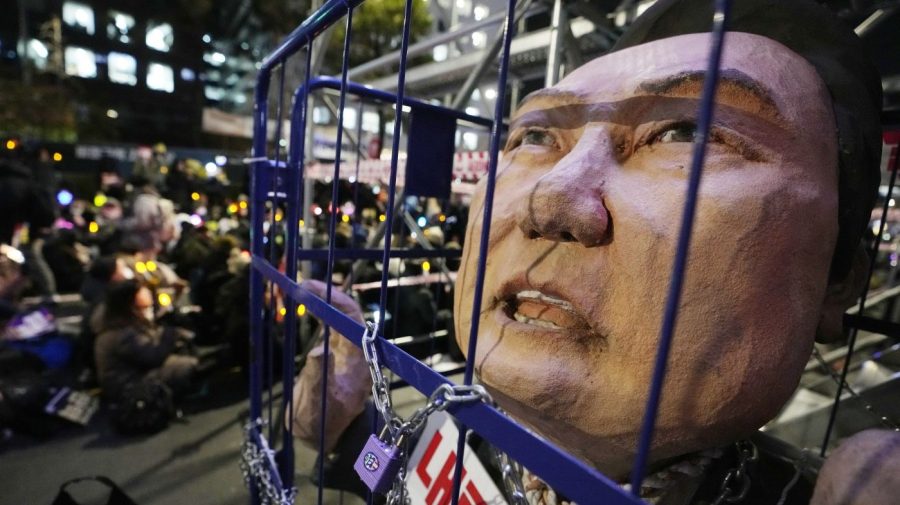[ad_1]

South Korean President v’s martial law declaration on Dec. 3 shocked the world. How could a vibrant, advanced democracy like South Korea revert so suddenly?
To stop the decree, 190 of the 300 members of parliament battled their way past gun-bearing soldiers to enter the National Assembly and vote to repeal martial law as thousands of citizens joined in protest. Yoon reversed his decree within six hours, but he defiantly resisted calls for his resignation and impeachment. Although Yoon survived the first impeachment attempt, pressure mounted for his removal. On Dec. 14, the National Assembly voted 204 to 85 to impeach the president.
The free world hailed the outcome as a win for democracy. Some cited South Korea as a teachable moment for America, with one commentator dubbing the episode as the “reverse Jan. 6.”
The same optimism abounded almost exactly eight years ago, when over 1 million candlelight protesters called to oust South Korean President Park Geun-hye on corruption charges. In what appeared to be a textbook case of democratic institutions at work, a successful impeachment and peaceful power transition ensued.
South Korea’s democracy has many merits. Its remarkable transition from a military dictatorship to a consolidated democracy in 30 years is one of the greatest democratic success stories in the post-World War II era. Democracy appears strong, as attested by high voter turnout, free and fair elections and a vibrant protest culture. South Korea’s 2024 Freedom Index score is 83 out of a 100, the same as the United States.
What belies this success, however, is the fact that South Koreans are living through near back-to-back presidential impeachment processes in under a decade. This is not an emblem of a strong democracy but the symptom of a deeply troubled one. As our research shows, the root of the crisis lies deeper than the political failings of Yoon or his party.
As in the U.S., a particular form of partisan polarization has intensified in South Korea — one that centers competing nationalisms. Party factions in South Korea are still divided along the lines of the Cold War era’s nationalist conflict, with the left espousing an ethnonationalist “One Korea” reunified with North Korea and the right championing a “Global Korea” aligned with the U.S.-led liberal order.
Any “us vs. them” dynamic can be dangerous for democracy. But when that divide centers on mutually exclusive visions of a nation, the effects are uniquely detrimental.
Nations are inherently “state-seeking”: they are political communities that pursue self-rule through exclusive and total ownership of the state. When political parties are consumed by nationalist pursuits, the rules of the democratic game are distorted. The end goal is not representation, but state capture; the opposition is not a valid competitor, but an existential threat to be eliminated. Nationalist polarization encourages party elites to violate the norms of forbearance and mutual tolerance, which function as the informal guardrails of democracy.
Such violations have long been rampant in South Korean politics. Yoon claimed that the opposition-controlled National Assembly motioned to impeach 22 of his appointments, including the minister of the Interior and chairperson of the Communications Commission. The opposition also moved to investigate Yoon’s wife, Kim Keon Hee, on corruption charges three times, which Yoon vetoed each time. Conversely, the ruling conservative party has put the opposition Democratic Party leader Lee Jae-myung through the ringer, indicting him for various corruption charges and finally convicting him of election law violations to sentence him to prison. Such vicious retribution cycles have followed every presidential turnover.
Political leaders and their families are not above the law, and, if found guilty, should be held accountable. But nationalist polarization has turned South Korean politics into a blood sport as political elites seek not to compete with, but destroy, the other side in the name of “our” nation. President Joe Biden’s controversial pardon of his son Hunter and possibly more in his inner circle — a preemptive measure against feared retribution from the incoming Trump administration — presents an America parallel.
Yoon’s action is a setback to South Korean democracy. It is also a harbinger for what can happen when nationalist polarization goes unchecked. The lesson for Americans who wish to safeguard democracy is not to praise South Koreans’ swift resistance, but to work to prevent the conditions that demanded it. Finding the core national values that still unite us despite growing disparities is key for democracy’s survival.
Andrew Yeo is the SK-Korea Foundation Chair at the Brooking Institution’s Center for Asia Policy Studies and professor of politics at the Catholic University of America. Aram Hur is the Kim Koo Chair in Korean Studies and assistant professor of political science at the Fletcher School of Law and Diplomacy at Tufts University. They are co-authors of the article “Democratic Ceilings: The Long Shadow of Nationalist Polarization in East Asia.”
[ad_2]
Source link

